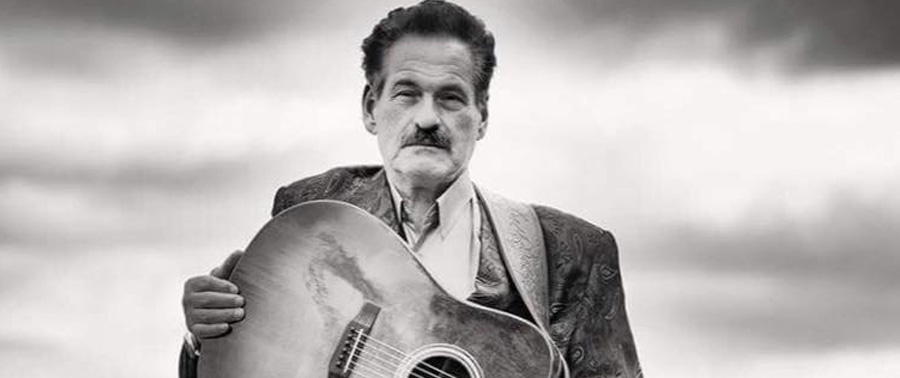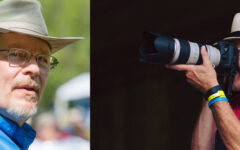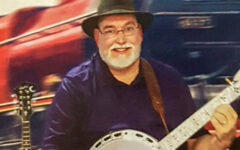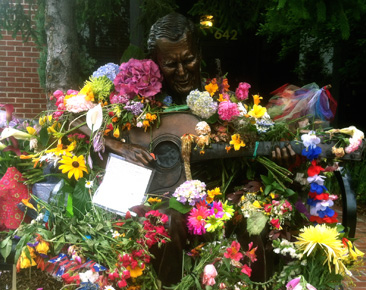
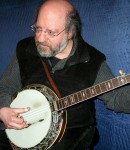 This remembrance of Doc is a contribution from Sandy Rothman, a former Blue Grass Boy and member of the Jerry Garcia Acoustic Band. Sandy is a recognized multi-instrumentalist with a long history on the bluegrass scene, with a pair of solo projects, and credits on many other albums. He has written previously about his experiences in the music world, and about the history of our music.
This remembrance of Doc is a contribution from Sandy Rothman, a former Blue Grass Boy and member of the Jerry Garcia Acoustic Band. Sandy is a recognized multi-instrumentalist with a long history on the bluegrass scene, with a pair of solo projects, and credits on many other albums. He has written previously about his experiences in the music world, and about the history of our music.
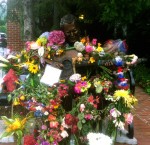 In the brief summer of ’64 when I was singing with the Blue Grass Boys, Bill mentioned Memories Of You, a 1950 vocal duet he’d recorded with Jimmy Martin, as one he wanted us to do. I knew the chorus but not the verses. The song hadn’t yet been issued on LP at the time. I wasn’t a singles collector, and Bill didn’t remember all the verses. He said, “Ask Doc Watson.” I don’t recall where I (or we) next saw Doc while traveling around the southeastern US that summer, but when I did, I asked him for the lyrics. Of course he knew them and with his warmhearted generosity was only too glad to share them with me, a kid of 18. I wrote them down from his accurately-remembered dictation and soon Bill and I were singing it.
In the brief summer of ’64 when I was singing with the Blue Grass Boys, Bill mentioned Memories Of You, a 1950 vocal duet he’d recorded with Jimmy Martin, as one he wanted us to do. I knew the chorus but not the verses. The song hadn’t yet been issued on LP at the time. I wasn’t a singles collector, and Bill didn’t remember all the verses. He said, “Ask Doc Watson.” I don’t recall where I (or we) next saw Doc while traveling around the southeastern US that summer, but when I did, I asked him for the lyrics. Of course he knew them and with his warmhearted generosity was only too glad to share them with me, a kid of 18. I wrote them down from his accurately-remembered dictation and soon Bill and I were singing it.
It’s hard to imagine that it was only the previous year, 1963, that the hugely influential Folkways LP simply titled The Watson Family was issued, and only a couple of years earlier that field recordings of Doc with Clarence “Tom” Ashley, Doc’s father-in-law Gaither Carlton, Clint Howard, Fred Price, and other family friends were released on two Folkways albums. These recordings were enormously inspirational to budding folk musicians all around the country (and the world) including Jerry Garcia and so many of us. From old traditional things like Everyday Dirt and The Crawdad Song to Doc’s flatpicking rendition of fiddle tunes like Black Mountain Rag (inspiring subsequent guitar trailblazer Clarence White and all who followed him) and on to the southern blues fingerpicking style he and his talented son Merle later perfected, Doc eventually reached back and incorporated some of the jazz and pop standards he’d been doing on electric guitar before recordist and folklorist Ralph Rinzler promoted his acoustic side during the Folk Revival.
When it comes right down to it, Doc did it all. He played and sang everything he wanted to. His rich voice was one with his fluid, impeccably tasteful guitar or banjo accompaniment. Chet Atkins reportedly once told him the reason people loved him wasn’t for his music but rather his good looks. It’s true that Doc was handsome—but I believe the real reason people loved him was because of his warmth, humor, and his essential humanity.
On the West Coast in July of 1967 Doc played for the closing of a Berkeley folk club, the Jabberwock, and was doing some oldtime picking with fiddler Hank Bradley and banjoist Rick Shubb. He’d asked them to make a tape with him as a demo for a proposed recording project (his label later rejected it) and as they began practicing for the session, Doc requested a rhythm guitarist. I was fortunate to get the call. He remembered me immediately—his prodigious memory was legendary, along with his ability to recognize people by their voices sometimes even before they spoke to him—and I was thrilled to be playing next to my guitar inspiration. At one point, listening back to some of the tracks, Doc turned to me and said, “Son, I can’t tell if that’s you playing or me playing.” I still can’t believe he said that. Calculated or not to make an unconfident young musician feel more relaxed, that’s exactly the effect his comment had.
Doc was a rare human being. He valued kindness even above music. Fame or position meant nothing to him, and he never gave up his values. In 2011 they put a life-size statue of him seated and playing guitar on a bench in the town of Boone, NC, not far from his home in Deep Gap. Doc asked that they include an inscription that reads “Just One of the People”…and so it does.

